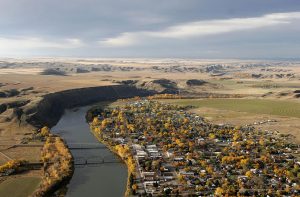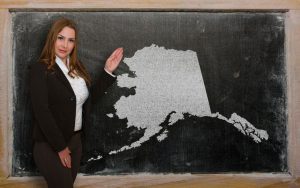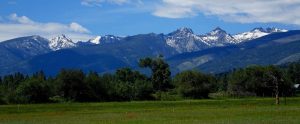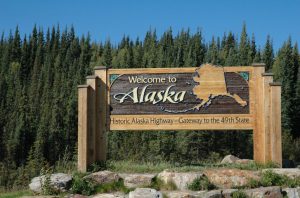If You’re a Teacher Thinking About Moving, There are 8 Questions You Need to Ask Yourself (and Your Heart) Before Making the Decision
3/23/2021

Here I sit in the hospital thinking about how many times I have been here. Staff at the hospital know me from frequent trips here over the past twenty years. My dad turned 90 this past week and I can't thank the Benefis Hospital in Great Falls, Montana enough as I believe he has been given more time. Thank god!
In 1998, I had completed my student teaching in Palmer, Alaska and had been doing a long term sub position in second grade in Anchorage at Northwood Elementary. Sadly, the teacher I was subbing for died of cancer. This was going to be a great first job on the "coveted" roadway system in Alaska. Most people who garnered jobs in Anchorage either had prior teaching experience outside of Alaska or had taught out in the "bush" in Alaska (off the roadway system). During the winter months of 1998, my dad suffered a heart attack which required a six-bypass surgery.
Flights back and forth from Montana to Alaska were quite expensive. It was always joked about that Montana was just as remote as flying into the "bush" of Alaska. I flew back and forth twice in the winter as we were told my dad was at a critical point in his life with his health. The doctor's at the time said he may only have two more years to live with his current diet and sedentary lifestyle. This of course made me think about my location and job!
I was offered a teaching job not only in Anchorage, but also out in the bush in a couple small villages. I loved the remote nature of Alaska and the mountain activities, but how do you price on time you are granted with one of your parents. It was a difficult decision as I was debating the position in Alaska with coaching and teaching with an estimated salary between $45,000-$50,000 as a first year teacher - a huge sum of money in 1999. The heart has a calling...my dad's heart!
I started researching jobs back in Montana. There was no way I was going to continuing flying back and forth to Montana with the status of my dad's health. Three jobs piqued my interest: Ekalaka, Fort Shaw, and Lakeside, Montana.
I had never been to Ekalaka and I considered it part of North Dakota. It was 629 miles or six and half hour drive back to Great Falls, Montana. I figured it would take the same amount of time to drive home from Ekalaka as it would to fly from Anchorage. I turned that job down.
I then interviewed for an elementary job at Fort Shaw, Montana only 30 minutes from Great Falls. The trustees and administration toured me through the building. I remember them touting the computer lab, full of iMac computers...very impressive for 1999. I was definitely interested and loved being close to Great Falls.
The next day I had an interview in Lakeside, Montana...a new elementary that had just been built overlooking the north end of Flathead Lake. If you have not been to Flathead Lake, you should know that it's an ugly, cold and inhospitable place that people try to avoid at all costs… alright - the truth is it's actually one of the most beautiful places this side of heaven, I just don't want too many people moving there. My classroom would overlook the lake...water skiing and snow skiing within minutes...I was sold.
For $19,100, I signed my first teaching contract in Lakeside, Montana. I was only three and half hours from home and I was able to have my mountains, my lake, and my dad all within a short distance. There are reasons why people move or stay in certain locations. One thing is for sure, the time spent with loved ones can never be replaced.
Whether in response to the pandemic or for other reasons, more Americans have relocated in the past 18 months than in any other time since the Great Depression and Dustbowl of the 1930's.
If you have been thinking about picking up and moving yourself, it's going to take some serious soul-searching before you make the final decision. Here are the eight questions your heart must answer as an educator who might be planning a move.
1 - How far am I willing to go from my support base and family?

Many of us grow up thinking we are going to grow up and move away. Growing up in small town America in central Montana, I dreamed about moving to the mountains. I wanted somewhere with lakes, and no wind. The Fort Benton area, and eastern slope of the Rocky Mountains in Montana, is known for wind every day. Many people don't mind it, but I hate wind!
I moved about as far away from Great Falls, Montana as you can get...Palmer, Alaska. In fact, from Great Falls, the distance to Palmer is roughly the same as it is to New York City! I was excited to adventure so far, and to teach...my passion!
Many Montana kids try their hand at working and living outside of Montana, but several find their way back. Some leave for the lifestyle, but mostly many return for family. My move back to Montana put me closer to my family, and Lakeside was within a weekend drive of most all of my family.
Taking a job where your family and friends are located is important to many new teachers searching for a job. Many of us need this support as we start a new job. Our friends and family are that base that can help us transcend to the next level in life. Yes, there are some of us that have a chance to move to a new location far from our base, but we need to ask ourselves if it's really a healthy move. Deciding whether to live and work close to family can be the most important decision you make as an educator.
2 - Why am I really moving?

Studying the "why" can help you reflect on what you need next in your teaching career. Is this move to further your education, a better job, a career advancement, or to be closer to a loved one. Sometimes the location where you are at doesn't provide that challenge that you so desperately are searching for in your career.
Some people relocate because they get the urge to move and have difficulty staying in one place. They change teaching positions every couple years and try something new. Delving into why a person may like that continual change may reveal more about their inner need for something that they keep searching for…. the old "grass is always greener" adage comes to mind.
Each of my moves has led me to valuable experiences, greater opportunities, and new challenges. In my 22 years of education this is my fifth school district. I went from being a classroom elementary teacher in a mid-sized school district (K-8, 520 students), to principal and athletic director in a small rural district (K-12, 215 students). I then moved closer to my parents and took a job as a teacher and instructional coach in a larger urban school district. While in that urban school district, the second largest school district in Montana (K-12, 10,500 students), I became an elementary principal. Finally, this past year I have made the transition to become a superintendent in a mid-sized school district (K-12, 1,300 students).
Answering your why is important. I found from experience you should not move for love unless the job and location are enough to continue if that love fades! That is not the first time I moved for love, but you think I would learn! Understanding your "why" is vital to making any move. I may not be the best example to follow, but that makes me the right person to offer advice, so make sure you have weighed your options before making that move!
3 - Does the location I'm moving to offer activities that correspond with my lifestyle?

Are you an indoor or outdoor person? Are you outgoing or do you like to keep to yourself? Do you like rural or urban areas? The great aspect about teaching is that you can find a job in most any location across the United States. Finding a location that matches up with what you like to do is important to your mental and social health.
As educators, we can all work every hour of every day, but when we can get away from work, recharging our batteries is essential. I am lucky to live in a location currently that has beautiful mountains, hiking trails ten minutes away from my front door, a lake 30 miles to the south, and a community full of restaurants and other places to meet up within minutes of my townhouse. In addition, I can be at school in under five minutes.
Making a list of all your hobbies is helpful. Matching that list with locations where you can do all those things can be a lot of fun when doing your research. Snow skiing, water skiing, hiking, boating, swimming, and visiting brew pubs are my favorite hobbies. I am lucky to be in a location where all my favorite hobbies are within minutes of my front doorstep. Understanding your lifestyle is important to your move. I am sorry, Ekalaka, Montana, I am not going to make it out there in my career.
4 - What's the tradeoff for the bigger paycheck?

Can you imagine turning down a $50,000 job for a $19,100 job? Money is not everything, and I believe educators prove that every day. My move from Alaska back to Montana obviously didn't have financial prosperity in the decision, but following my heart back home was important. You may be moving for money.
Currently, I chose a position that pays less than what I've grown accustomed to making the past decade, but I wouldn't trade it right now. I love challenges, and this position is definitely more challenging than any other I've experienced. Being a new superintendent has had its own difficulties, and not because of the Covid-19 Pandemic, but because building culture here has been challenging. With seven classrooms in portables at the primary school level, my goal is to build a new school in this district.
People may move for a better paying job across the United States. I had started out in Alaska because I knew salaries were at least twice as much up there as they are in Montana. Now, several areas across the US have unbelievable salaries as compared to my state of Montana. Money might be a factor in your move, but make sure you weigh all the factors that are not money related!
5 - What do I know about the school I'm applying to?

Schools are doing a much better job of promoting who they are and what they are doing. Many schools believe in this powerful mantra, "Who is telling your story? If you don't tell your story, someone else will, and you may not like the story they tell."
With more and more aspects of school life, culture, and curriculum online, you can now research a school more than ever. Before I set foot on campus to interview for my current position, I was able to read the board minutes, study the school district's Five Year Goal Plan, and see the faces of all staff members.
Invest some time into learning as much about the school district as you can before you ever apply for the job. Does your research match or exceed your expectations? Does your research bring up red flags? I looked for green flags in my current position: positive school culture, strong vision and mission going forward, award winning staff, and more that piqued my interest as an interview candidate.
By checking the prospective school's social media accounts, you can tell the story that the district is trying to tell the community. A strong social media presence is necessary when so much of our society is online. If they do not have a strong presence, but everything else matches your needs and wants for a job change, technology might be an area that you can contribute to the new school district yourself.
6 - How will the move affect my retirement or future moves?

The idea of thinking about your retirement may seem foreign or premature. Whether it is changing jobs early in your educational career, it is never too soon to learn about your retirement options! When changing jobs, it is definitely something that we should think about as we leave one district and enter another.
When changing school districts, make sure you understand what is in your current contract. You may find that if you stay another year, you are entitled to a buyout of your sick days or personal days. This may be substantial. Some teachers move prematurely and lose out on several thousand dollars because they don't know their contract very well, or are willing to move and leave the money behind.
If changing states, knowing the retirement requirements is an essential factor in determining what you are leaving behind, as well as what you are going to be buying into. For example, Alaska has changed their retirement qualifications after drilling in the oilfields was decreased. This affected education substantially. During the 80's and 90's you only had to work seven years to get vested in the Alaska retirement system. I left Alaska after putting in one year. I would only need another 6 years in-service back in Alaska to garner another retirement.
In Montana, I need a minimum of 25 years of experience teaching in the state to start drawing retirement. I could receive two retirements (Alaska and Montana) by the time I am 55 years old. This would be smart, but I don't know if I will make it back up to Alaska.
It definitely is smart to learn the retirement benefits for both the school district you are working, as well as the school district you will be starting your new job. In addition, take time to learn the retirement qualifications for the states in which you plan on working. It will pay off in the end!
7 - Have I thought about the change in living expenses?

Milk was $10 a gallon and a frozen pizza was $21 in Chevak, Alaska in 1998. Luckily, my housing was free and moving costs were taken care of when I taught summer school in the "bush." Chevak is located between the Yukon and Kuskokwim Rivers. I was astonished at the grocery prices in this small fishing village 518 miles west of Anchorage. My first teaching contract offered to me with basketball coaching was nearly $50,000. I was intrigued by the money.
Flying back and forth to Montana was well over $600 per flight. The flights consisted of a two seater plan from Chevak to Bethel, a larger propped plan from Bethel to Anchorage, then a jet plane from Anchorage to Seattle, and the same size plane from Seattle to Great Falls, Montana. This flight path would usually take a span of 24 hours, but the weather always played a role in this timeline. In fact, I spent an extra week in Chevak due to a storm that included fog that was so thick planes would not land nor take off.
The expenses of rent or mortgage, food, travel, and fun should all play a factor in the locations you are looking at teaching. Finding out what your school district provides is essential in making the correct decision. In some of the most remote locations in Alaska, I have been offered free housing, college loans paid off, a certain number of meals per week, computer and all utilities paid, and even a stipend to travel out of the district once a year. In comparison, my current Montana job includes a laptop and a cell phone stipend.
Do your research into the living costs of the location where you're planning to move. Making a comparison table between expenses can make or break a decision to take a new job. Spend the time to really understand the net benefits of relocating based on your financial situation.
8 - Where is my heart on this move?

Ultimately, you must follow your heart when it comes to understanding where you want to live and why. Whether it's to be closer to family, more money, a better position, or to work where you want to spend a majority of your time playing, the decision is up to you. All the advice in the world doesn't change the fact that where you chose to reside and work has special meaning to you.
Whether your move is for a loved one, family or friends, or merely for adventure, there is always risk involved. Weigh your risks and other factors before you make the move.
Some people find a school district with strong culture and they never want to leave. They may have been in other districts and realized they wanted to be back in the school district they left. This may even be for personal reasons. These are the moves that we make in our lifetime. They are important to us and our mental health. Nothing can be more powerful than following your heart!
- Learning How to Say No and Set Boundaries with Parents - November 21, 2022
- If You Had Only One Behavior Strategy to Use in Your Classroom, What Would It Be? - September 26, 2022
- Live Your Code: 7 Strategies That Will Help You Be the Most Effective Educator You Can Be - August 15, 2022











